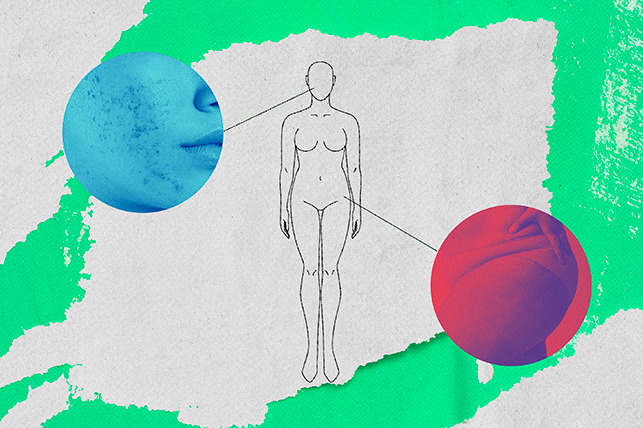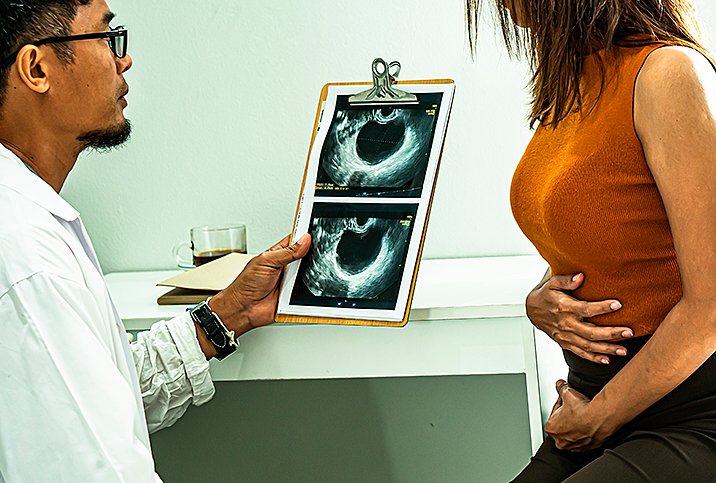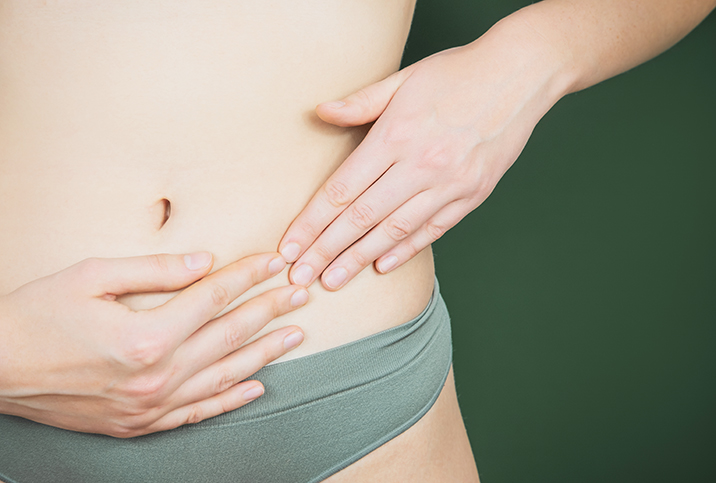An Irregular Cycle Might Be the First Hint of PCOS

Polycystic ovary syndrome (PCOS) is a complex metabolic disorder that can cause a range of symptoms. For women of reproductive age, it's the most common endocrine disorder.
While it's normal for women to have a small amount of androgens—such as testosterone, the sex hormone typically associated with males—PCOS creates excess levels of androgens. The exact cause of PCOS is unknown, but researchers suggest environmental and hereditary factors play a role.
How PCOS affects bodily systems
PCOS is a multisystem disorder, meaning symptoms impact different systems in the body, explained Ana Maria Kausel, M.D., an endocrinologist and the co-founder of Anzara Health, a telemedicine provider in Miami. In the reproductive system, PCOS can cause abnormal cycles, missed periods for a few months, heavy bleeding and infertility. Most women have fewer than nine periods per year with PCOS. Infertility with PCOS is widespread, affecting 70 percent to 80 percent of women who have it.
PCOS is one of the most common causes of infertility in reproductive-age women. However, it is still possible to become pregnant while living with PCOS.
Kausel said the syndrome affects the metabolic system, or how the body converts food to energy, in the following ways:
- Abnormal weight gain
- Darkness of the skinfolds, known as acanthosis nigricans
- Insulin resistance (quite common)
- Prediabetes
- Type 2 diabetes
- Fatty liver
- Obesity
The syndrome can also have cosmetic effects such as hair loss, hirsutism (hair in unusual areas) and acne, which is common for patients with PCOS.
Some women with the disorder also develop small cysts around one or both ovaries. Of important note, you can have ovarian cysts without having PCOS, and have PCOS without having ovarian cysts. For PCOS patients, the ovaries are typically enlarged and contain many small follicles. PCOS cysts may play a more significant role than non-PCOS cysts in whether or not someone can get pregnant.
PCOS can also lead to mental health issues such as eating disorders, depression and anxiety, Kausel said. Research has not pinpointed one specific cause of psychiatric disorders among PCOS patients, but a combination of factors—hormones, unwanted cosmetic changes, PCOS symptoms—could influence the prevalence of anxiety and depression.
Women with PCOS have eating disorders at a higher prevalence than women without PCOS, according to research. One possible connection is that PCOS predisposes people to weight gain and is associated with people who have higher weights. It is also related to insulin resistance, which may lead to weight gain or make it more difficult to lose weight.
Sometimes the symptoms of PCOS are apparent, such as missed periods, but sometimes they are more minor, such as acne. Some people might assume that such varying symptoms are not connected to one syndrome. Some symptoms can also be experienced more severely than others and develop over time.
Diagnosis and testing
Symptoms of PCOS most commonly arise when someone first starts to menstruate.
"Usually, women present with reproductive or menstrual cycle symptoms. Metabolic, cosmetic and psychiatric symptoms tend to take longer to develop," Kausel said.
There is no singular test for PCOS, but a healthcare provider can make the diagnosis through varying criteria. The first is a medical history focused on menstruation. A physician asks simple clinical questions about a patient's menstrual cycle and its characteristics, skin symptoms and weight gain, according to Kausel.
A provider screens further by observing the patient and doing a complete physical exam, and ordering complete blood tests that measure androgens and reproductive and metabolic hormones. They may also perform a pelvic ultrasound.
An ultrasound can detect ovarian cysts; blood tests can detect hormonal imbalances; and talking to a patient about their menstrual history can identify irregularities.
A patient must present with two of these three criteria for a PCOS diagnosis: irregular periods, higher levels of androgens, and polycystic ovaries. But the diagnosis is one of exclusion, and other causes of irregular periods must also be ruled out.
Complications of PCOS
PCOS can create long-term complications and increase your risk of developing other diseases. Like its symptoms, the disorder's complications affect different systems.
For the reproductive system, complications of PCOS can include the following:
- Infertility
- Endometrial hyperplasia
- Endometrial cancer
Hyperplasia and cancer occur because the cells of the endometrium, the lining of the uterus, are designed to last only one menstrual cycle, but with chronic amenorrhea—the absence of menstruation, which is usually a symptom of PCOS—these cells start lasting longer than expected, Kausel said.
"They don't get shed with menstruation, causing abnormal growth. This abnormal growth, with time, can lead to endometrial cancer," Kausel added.
Metabolic complications include insulin resistance, which can cause abnormally high insulin and sugar levels in the blood. That can lead to type 2 diabetes, obesity and fatty liver. Up to 88 percent of patients with PCOS are overweight.
Other complications are cosmetic.
"Acne, hair loss and hirsutism [excessive hair growth] are not severe complications but can cause severe psychological distress," Kausel said.
When is it time to see a doctor?
Kausel said any menstrual cycle abnormality should send someone to the doctor for an evaluation of symptoms. Cycles typically run between 28 and 32 days, but anytime between 25 and 35 days is considered "normal."
"Women should have, in normal circumstances, one menstrual period per month," Kausel said.
Infertility is another symptom that should prompt a doctor's appointment. Based on a patient's age, infertility is defined as not being able to conceive after six to 12 months of unprotected sex.
Abnormal weight gain, darkening of the skinfolds and insulin resistance are part of PCOS symptomology, so it's best to seek evaluation from a provider if you experience any of these conditions. Kausel said not being able to lose weight despite healthy living could require a doctor's visit, too.
"I would also add [that] any young woman with a diagnosis of prediabetes or diabetes type 2 should be evaluated for PCOS," Kausel said.
Skin and cosmetic symptoms—acne, hair loss or the appearance of black hair in unusual areas, such as the chin, face, chest or around the nipples—could warrant a trip to a physician.
While PCOS symptoms don't go away on their own, various types of treatments can help. Seeking treatment and early diagnosis can also help prevent diseases for which the condition may heighten the risk, such as diabetes, high blood pressure and heart disease.
It's not always easy for people to seek help, especially for something as personal and sensitive as menstruation issues. Plus, if you don't have a regular physician, taking that first step can be difficult. Video visits have become a viable option for most people, and more physicians have added them as a service. Giddy telehealth makes it easy to get connected to a qualified healthcare professional who can help with a variety of conditions, including PCOS.


















